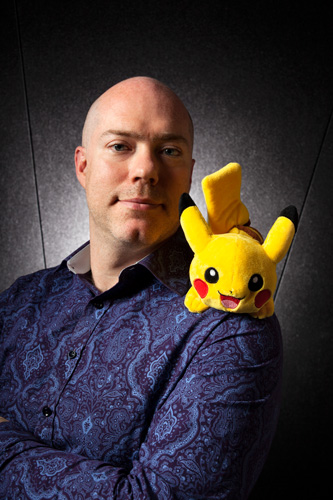
Pokémon Go was everywhere this summer. Seldom has any video game so completely permeated the cultural conversation, so quickly. It was in the headlines, police blotters, morning talk shows – even penetrating the impervious-to-the-passage of-time funny-page staple Family Circus.
by Mark Reynolds
“Well, that’s one I didn’t even know was on my bucket list until just now,” laughs Don McGowan, BA’92, DipEnvironmentalStudies’94, LLB’97, BCL’97, when he learned about Billy Keane’s Pokémon-name drop.
McGowan is general counsel for the Pokémon Company International, the folks behind the “pocket monsters” on Pokémon cards, Pokémon video games, Pokémon TV shows, Pokémon toys of all shapes and description, the Pokémon Go smart phone game and – as inevitably as Mewtwo crushes Magikarp – next year’s Pokémon movie.
When he first began his legal practice after graduating from McGill, McGowan’s initial clients weren’t quite as colourful as Jigglypuff or Bulbasaur. He did stints in Stikeman Elliott and Osler Hoskin and Harcourt – both firms with large Montreal offices.
A senior lawyer from Microsoft happened to be in the audience when McGowan made a presentation on privacy law at a legal conference in San Francisco. This was in the early 2000s, when governments and private companies were waking up to the potential and peril of Internet-enabled privacy breaches. Not long after, McGowan was working in Microsoft’s Seattle headquarters, consulting with their engineers on legal issues pertaining to data encryption.
He eventually transferred into Microsoft Games Studios. There, McGowan was involved in a staggering array of legal issues – marketing, licensing, intellectual property, negotiating product placements for the games (and within games) and devising contracts with car companies featured in racing games to ensure that their vehicle’s performance was rendered accurately relative to their competitors.
Gaming, already large at this point, had begun to explode into a major factor in the entertainment world, with game releases like Halo 3 pulling in bigger bucks than some Hollywood blockbusters. The work was broad – and sometimes very esoteric.
“You know e-sports – online tournaments of video game players? It turns out that I was probably the first person to negotiate an e-sports contract,” says McGowan with a laugh.
The variety of players with whom McGowan has collaborated over the years – engineers, artists, movie studios, toy manufacturers and professional video game players – has required that he be able to quickly adapt to completely different industry expectations on the fly. McGowan credits his ability to be nimble to his education at McGill.’
“At [the Faculty of Law] we talked about how we were sitting inside multiple cultures at the same time. And that’s given me a good set of lenses, where I can look at something from divergent viewpoints at the same moment. I credit a lot of my ability to have the success that I’ve had to the highly unusual cross-cultural training you get looking at issues in the McGill law school.”
While still a McGill student, McGowan played an important role in a milestone event in the University’s history. He was one of the driving forces behind a student referendum to rename the University Centre after Star Trek icon William Shatner.
“Tek War is my Atlas Shrugged,” McGowan explains, adding that he used to act out scenes from the Shatner-penned book for fellow students at Douglas Hall. After the victorious vote, the Students’ Society of McGill University began referring to the building as Shatner. The University, though, didn’t recognize the name change – the student vote had no impact on the University’s own official naming policies. The Shatner name has come to be widely used, though, and even a few senior administrators occasionally refer to the building as Shatner in unguarded moments.
McGowan joined Pokémon in 2008. “At the time, people would say to me, ‘Are they still around?’”
He doesn’t get the “Are they still around” question anymore. Pokémon Go has been downloaded onto more than 100 million phones world-wide. McGowan says that while he didn’t quite predict how enormous a hit the game was going to be, he had no doubt that it was going to be a success.
“You always hope that the things you work on are going to be big. I got the alpha version [of the game] in January. I remember playing it for the first time, and saying to my wife, ‘This is going to destroy everything in its path.’”
Pokémon Go indeed flattened all competition and dominated playgrounds, water-cooler conversations and the thoughts of ‘wither Western civilization’ columnists around the world. But that isn’t what McGowan will remember from the summer of ’16. The game was designed to get people outside and interacting with their community.
“Parents would reach out and say, ‘My deeply autistic child got Pokémon Go on his phone, and started going to the park, and started talking to other children, and I never thought I would see my child acting like this. Thank you Pokémon, you’ve changed my life.’”
This article was originally published in the McGill News in September 2016.
